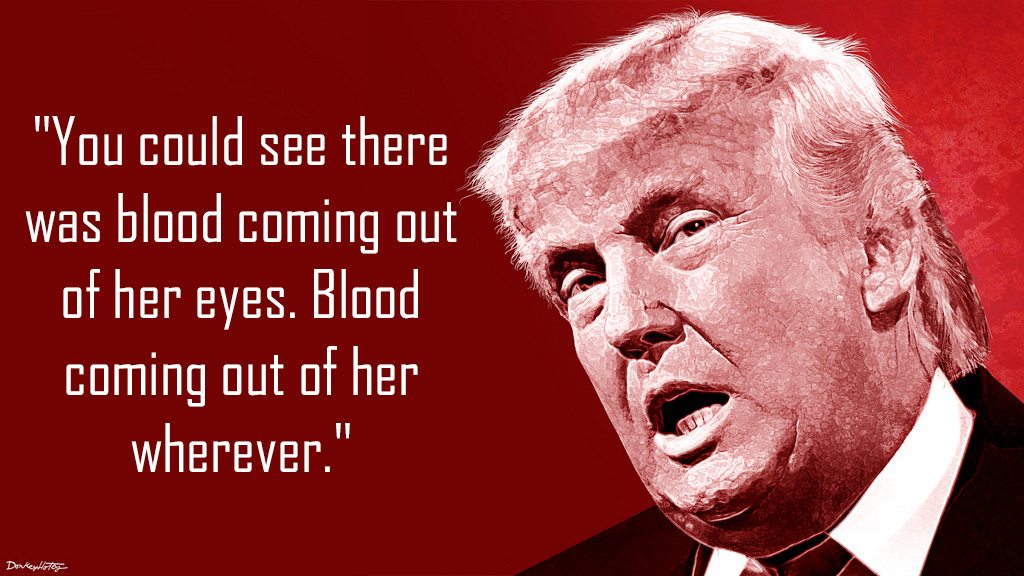Misogyny is the Biggest Indicator of Trump Support

Image credit: Flickr/DonkeyHotey
THE BIGGEST BOMBSHELL of the 2016 presidential election was not Hillary Clinton’s email troubles or Donald Trump’s loss of Twitter privileges. Instead, it was a study from University of Michigan researchers proving that, despite what we may have all thought, misogyny is the biggest indicator of Trump support .
Although Trump’s detractors have called out his sexism , the GOP nominee’s racist sentiments became his calling card early on in the campaign, when he suggested that Mexican immigrants are rapists, drug dealers, and criminals . Until a hot mic tape revealed that Trump bragged to Billy Bush about committing sexual assault , Republican politicians and voters remained in-support of the candidate, ignoring or dismissing whatever pervasive and violent xenophobia Trump spewed. As soon as Trump’s rhetoric threatened white women , however, conservatives began to retract their endorsements .
And so, for many, it came as a surprise to learn that people who exhibited hostility toward women were more likely to support Trump than those who were racially prejudiced. Certainly Trump was a virulent misogynist, but weren’t his followers generally racist, and only benevolently sexist ?
As it turns out, no. University of Michigan researchers Carly Wayne, Nicholas Valentino, and Marzia Oceno found that hostility toward women was among the biggest indicators of Trump support, outpacing racism and authoritarianism. That isn’t exactly new information. In 2008 and 2012, studies showed a correlation between similar factors and a lack of support for Hillary Clinton . But where those surveys linked traditional views on gender to dislike of the female presidential candidate, the University of Michigan research shows that those beliefs have no influence on a person’s likelihood of opposing Clinton’s candidacy.
Wayne, Valentino, and Oceno measured benevolent sexism by gauging online survey respondents’ agreement with a short series of statements, such as “Women have a quality of purity that few men possess” and “Every man ought to have a woman whom he adores.” Vox reports that holding benevolently sexist views “didn’t correlate much at all with support for Trump, at least before the leaked Access Hollywood tape.”
On the other hand, the researchers’ nationally representative survey asked whether individuals agreed with more misogynistic statements that are “widely used in social science research on sexism and gender attitudes,” including “Many women are actually seeking special favors, such as hiring policies that favor them over men, under the guise of asking for equality.” This kind of aggressive sexism had positive correlation with support for Mitt Romney in 2012, and was — unsurprisingly — linked to a lack of support for both Clinton’s and Obama’s candidacies.
For researchers and readers alike, the idea that Trump supporters are sexist is kind of a big yawn. We know that voters choose candidates whose personal beliefs are like their own , and we’ve known for decades that Donald Trump has neither love nor respect for women. But, the University of Michigan surveyors say, data now shows that the dominant portrait of Trump’s support base — as a group of impoverished white men afraid of economic stagnation and outside influence — is largely inaccurate.
Instead, Wayne and her colleagues claim that “the role of racial prejudice or sexism [in support for Trump’s presidential campaign] may be catalyzed more by anger” than fear. Certainly, some of Trump’s supporters may be afraid of change. There are large communities of working-class people who feel disenfranchised for a number of reasons, not least of which is that their counties have yet to recover from the Great Recession . Although much of their ire is rooted firmly in nostalgia for an overly romanticized period of widespread, legal discrimination, many of these people truly fear — thanks to decades of lies and smear campaigns from the right — that the U.S. is spinning fast toward a point of no return, after which it will become an invaded wasteland.
It is both impossible and unconscionable to divorce the yearning for “a simpler time” from the racism inherent within it, however. Whether the conservatives who avow the 1950s as the pinnacle of U.S. achievement realize it or not, they long for a return to a set of perceived values and morality that threatens the existence of most Americans.
It becomes dangerous, then, to talk about Trump supporters’ opinions and political positions in terms of fear rather than anger. Judges and juries excuse crimes because the perpetrators feared for their lives, but Trump’s supporters — who assault journalists and protesters , and may have even committed a hate crime in Mississippi — don’t deserve that leniency.
Trump voters aren’t “fearful authoritarians,” but enraged bigots. They aren’t afraid of Muslims, Mexican immigrants, and other people of color, nor worried that they will infuse U.S. culture with so-called “un-American” values. Instead, Trump’s supporters are angry that non-whites, non-Christians, women, and LGBTQIA individuals have a seat at the table, that they no longer control every boardroom and statehouse. They act and vote on base, toddler-esque emotions, much like their candidate.
